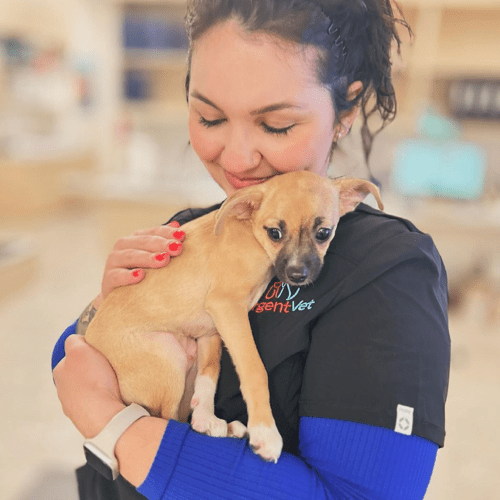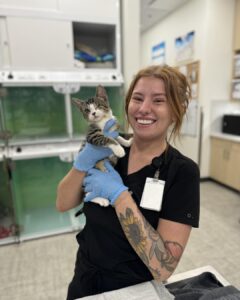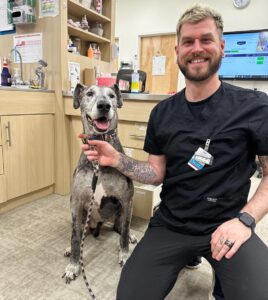Imagine this: Your primary veterinarian’s office is closed, and your beloved pet isn’t quite themself. Your pet may not be experiencing an emergency, but they are definitely ill, and you are extremely concerned. Figuring out the best course of action in this situation can be tricky. You don’t want to ignore the issue, but you also don’t want to panic or jump to conclusions.
Every pet parent wants the best for their four-legged friend, in matters large and small. That’s why understanding the most common reasons why pet parents seek after-hours veterinary care can give you the assurance you need to visit UrgentVet with confidence.
#1: Vomiting in Pets
Nothing grabs a pet parent’s attention more than hearing or seeing their pet throwing up. Vomiting has countless potential causes and poses a risk of dehydration, which can develop quickly. Fortunately, pet parents usually act quickly if their pet has been vomiting, which helps prevent dangerous dehydration.
Although the occasional vomiting episode can be normal, repeated vomiting, vomiting blood, or vomiting accompanied by other signs, including appetite loss, diarrhea, bloating, or lethargy, can signal a serious underlying cause such as toxin ingestion, intestinal obstruction, or a contagious virus. Vomiting should always be taken seriously, especially in young, old, and sick pets.
#2: Diarrhea in Pets
Perhaps equally alarming—and messy—diarrhea (i.e., unformed or loose stool) occurs when digested materials move too quickly through the intestines, disrupting normal nutrient absorption and stool formation. Diarrhea may have an unusual color and contain mucus or blood, which may be bright red or black. Recurring diarrhea can lead to dehydration and weakness, especially in puppies, kittens, and senior pets. If your pet is otherwise acting normally, you should be OK to monitor their loose stool until your primary veterinarian’s office is open. However, frequent bowel movements, straining to defecate, blood in the stool, weakness, or other signs merit a visit to UrgentVet.
#3: Skin Issues in Pets
Skin problems, including allergies in dogs, cat allergies, infections, hot spots, and irritations such as insect bites and stings, can make pets miserable and trigger obvious discomfort signs such as incessant scratching, restlessness, chewing, licking, anxiety, and facial rubbing. In addition to your pet’s suffering, these behaviors can also lead to other complications including secondary infections and self-injury, negatively impacting your entire household’s quality of life. After-hours care at UrgentVet can quickly ease your pet’s discomfort and give you peace of mind—and a good night’s sleep.
#4: Urinary Issues and Pets
Dogs and cats experiencing urinary problems, such as infections, bladder stones, cystitis (i.e., bladder inflammation), or a blockage, can exhibit concerning signs. These signs can include house soiling, frequent urination, straining to urinate, blood in the urine, and vocalizing while urinating. Such signs indicate an underlying issue that requires prompt attention, especially in male cats who may be experiencing a life-threatening urinary obstruction. Learn more about:
#5: Acute Pain in Pets
Although acute pain causes can vary greatly from a herniated intervertebral disc in the back or neck to a dental abscess, one thing is certain—pets in acute pain are in significant distress. Pets in acute pain may exhibit various signs ranging from obvious to subtle, including lameness (i.e., limping), vocalizing, irritability or aggression, hiding, uncharacteristic anxiety or fear, and appetite loss. If your pet is painful, don’t attempt to medicate or treat them at home. Contact your nearest UrgentVet or walk-in for a convenient assessment of your pet’s condition and pain relief.
#6: Limping in Pets
Limping or limb favoring suggests discomfort or pain somewhere along the affected limb, but this sign can sometimes indicate that your pet has a problem in their neck or back. Lameness assessments generally include a thorough exam of a pet’s limbs, starting with the toes and paw, and including each joint (e.g., wrists, knees, elbows, shoulders, and hips) and each limb’s surrounding soft tissue (i.e., muscles, tendons, and ligaments). In addition to an orthopedic assessment, your pet’s nerve function may also be evaluated to ensure that sensation throughout their limbs is normal. Learn more about:
#7: Minor Injuries in Pets
Wounds, lacerations, torn toenails, and other minor injuries can still be a major concern—especially if your pet is in pain. While these injuries might not seem urgent, they can cause discomfort, and delayed treatment can lead to complications. Seeking after-hours veterinary care for such minor injuries ensures that your pet heals properly and will be protected from pain, delayed healing, and infection.
While preventive veterinary care and responsible pet ownership are the best ways to minimize your dog’s or cat’s illness or injury risk, unexpected calamities can and will still occur—often after your primary veterinarian’s office is closed. Knowing how to respond and where to take your pet for after-hours care can minimize your pet’s distress and speed their recovery. If your pet is sick, injured, or simply not acting like themself, UrgentVet provides convenient, knowledgeable, compassionate care beyond normal business hours. If you’re concerned about your pet’s health, safety, or comfort, so are we—check in online or walk in to an UrgentVet location near you, because your pet can’t wait to feel better.




